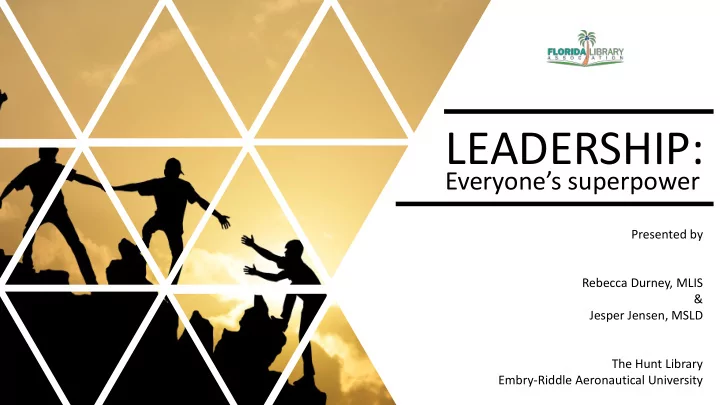

LEADERSHIP: Everyone’s superpower Presented by Rebecca Durney, MLIS & Jesper Jensen, MSLD The Hunt Library Embry-Riddle Aeronautical University
AGENDA Leadership perception Leadership misconceptions Definition and Literature Review Leading from any organizational level Tools to enable leadership
What does leadership look like?
Leadership misconceptions: -Boss -Hero
Leadership defined: “Leadership is the process of influencing others to understand and agree about what needs to be done and how to do it.” (Yukl, 2013, p.7)
Leadership is relational, not positional
Sway your boss(es) and those further up the hierarchy Mobilizing outside peers in Influence inside peers in other 360 Leading other organizations and society departments and units Engaging one’s direct reports and those further down the hierarchy
Tools to enable leadership skills
Emotional Intelligence …just as important as IQ when leading
Volunteer/Take initiative
Self-motivation and self-empowerment
Patience and persistence
Know your boundaries
Partner with like-minded people
Communication
Excel in all that you do
Adaptation is key
Conclusion Leadership is not about position or being a hero; i t’s about influence and it can be practiced by anyone at any organizational level.
REFERENCES: Arnoold, J., Nickel, L.T., & Williams, L. (2008) Creating the next generation of library leaders. New Library World, 109(9), 444-456. Bielaszka-DuVernay , Christina. (2009). How to Lead When You’re Not the Boss. Harvard Business Review. Retrieved from https://hbr.org/2009/02/how-to-lead-when-youre-not-the Goleman, D. (2004). What Makes a Leader. Harvard Business Review. (82(1), 82-91 Kelley, R.E. (1998). In Praise of Followers. Harvard Business Review. 66(6), 142-148 Lucas , Suzanne. (2015). 10 Tips for Leadership When You’re Not the Boss. Inc.com. Retrieved from https://www.inc.com/suzanne-lucas/10-tips-for-leadership-when-you-re-not-the-boss.html Meyer, Ron and Meijers, Ronald. (2018). Leadership Agility: Developing Your Repertoire of Leadership Styles. New York, NY: Routledge Mierke, J., & Williamson, V. (2017). A Framework for Achieving Organizational Culture Change. Library Leadership & Management, 31(2), 1-16. Obolensky, N. (2014). Complex Adaptive Leadership. (2nd. Ed.). Burlington, VT: Gower Publishing Company Ulrich, D. (n.d.) What is an effective leader? [Web Page]. Retrieved from: www.amanet.org/training/articles/what-is-an-effective-leader.aspx Wergin, Jon F. (2006). Leadership in Place: How Academic Professionals can find their Leadership Voice. San Francisco, CA: Wiley Yukl, G. (2013). Leadership in organizations (8th ed.). Upper Saddle River, NJ: Prentice Hall Creative Common Image Sources: Pexels.com and pixabay.com
Recommend
More recommend